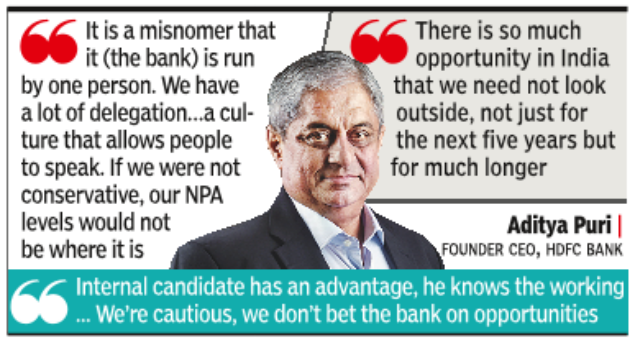‘Can create a middle class in rural India too’
What’s behind the choice of Sashidhar Jagdishan?
I was only an adviser on the search committee, which set out the criteria. To take the bank to the next level, we said we would look internally and at candidates from all across the world. We needed someone who has handled scale and has an understanding of issues relating to technology, the future of banking and also macroeconomic conditions to get an idea of opportunities and dangers if we went in the wrong direction. As a change agent, Sashi has been instrumental in implementing the fundamental shift where we compete with tech platforms rather than banks and use technology to grow the under-penetrated market in India.
At this point, does the bank need a CEO who is more cautious or growth-oriented?
HDFC Bank has a culture of being very cautious. We get growth because the market opportunity is available. But when we see an opportunity, we do not bet the bank but test it out first. Whether it was the closed user group for stock exchanges, the 10-second loan, or expanding to semi-urban and rural India — we test, test, test.

Do you feel this is the time to grow business?
It’s a great time to grow. But grow recognising that we are a fiduciary organisation and have to return the depositors’ money. The opportunity for us is the way India will lead in digitisation, where the basic framework is already in place. We have broadband and mobile phones all over, but we have to fix the nuts and bolts like e-signature and e-documents. In semi-urban and rural India, GDP per capita just crossed $2,000, and 60% of the country lives there. So, you can actually create a middle class that is equivalent to the current middle class in the country.
How do you see the relationship with HDFC evolving? Some people have been seeing a merger as an eventuality…
For now, it is a win-win situation for both. Unless something changes fundamentally, we do not see any reason to change that. Because we originate loans by using our distribution capability and we buy back 70%, that gives us a lot on the priority sector side, which we would not be able to do on our own. So, we are quite happy with the arrangement. And I don’t see why this should not continue.
Why did you choose to sell your holdings in the bank?
The shares were acquired under ESOPs, which is approved by the RBI, along with base salary and given at market price. So, you have to factor in the purchase price and the tax. Higher the value of the share, the more money I need to exercise the option and pay tax. Also, I am 70, and should I not think about my life?
There has been speculation that you may join a business group to help them with financial sector plans…
I have a large customer base, some of whom are my largest customers. So, interacting with them is part of my current job. Now, there are all kinds of rumours and I do not want to comment. Nobody has approached me yet. If they do, I will look at it. If you are asking me if I am going to sit at home, the answer is no. There are two areas where I plan to do something. One is where good healthcare can be extended to a large section of the population at an affordable price. I am also looking at education in elective courses to make students job-worthy. We can also do a lot more in the uneducated but skilled category. But that doesn’t mean that if a damn good offer comes my way, I will not examine it on its own merits.
Source link




